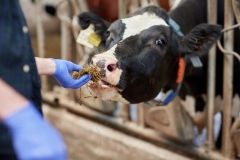A piece of research conducted in the Molecular and Functional Biomarkers group at CIC biomaGUNE, led by the Ikerbasque professor Jesús Ruiz-Cabello in collaboration with NEIKER and the UCM-Complutense University of Madrid, has developed a blood-based method for diagnosing bovine TB that overcomes the limitations of current techniques.
Bovine TB is a bacterial disease that causes debilitation, pneumonia and even death in the animal, and can in turn spread to humans. The tuberculin skin test provides false positives in healthy vaccinated subjects and in others infected by different bacteria. The technique presented in the scientific journal Transboundary and Emerging Diseases is more sensitive, cheaper and faster than current techniques. According to the researchers, "in addition to improving the diagnosis of subjects with the disease, it avoids the slaughter of a large number of uninfected subjects that are currently deemed to be positive".
The method developed identifies a metabolic profile –molecules involved in chemical reactions in living beings– in blood samples. These metabolites are routinely measured in medicine in the context of glucose or uric acid in the blood. What sets this method apart is the fact that "it is capable of taking a snapshot of all the metabolites in a biological sample and identifying how an infection modifies all the host metabolites simultaneously. This distinctive profile is a kind of fingerprint that allows us to diagnose infected subjects even before they display any visible symptoms", they explained. The analysis of the blood sample is carried out by means of benchtop Magnetic Resonance Spectroscopy, and the results are available within fifteen minutes.
Human and animal health are interdependent
"This work, related to the detection of bovine TB, emerged out of a previous piece of work carried out at CIC biomaGUNE on human TB. Thanks to the collaboration of the Basque Institute for Agricultural Research and Development NEIKER, we obtained samples with which to continue the study," said Dr Jesús Ruiz-Cabello, Scientific Assistant Director of CIBERES. In fact, to carry out the study, the researchers analyzed samples from cows on farms in the Basque Country with a range of profiles: cows infected by TB, healthy vaccinated animals, healthy unvaccinated and infected by another similar bacterium, paratuberculosis. The tool was subsequently validated with cows from central Spain and Galicia.
Once proven to be effective in larger samples, this method could be applied to diagnosing human TB and other diseases, such as respiratory failure due to COVID-19. The researchers stressed that "within the 'One Health' concept, human and animal health are interdependent and linked to the ecosystems in which they coexist, as we have seen in the COVID-19 pandemic". So, as they added, "tools to monitor veterinary diseases need to be developed, so that the conditions of these animals and the profitability of the industry can be improved, and so that the transmission of these diseases to humans can be monitored".
In addition to the Biomaterials Cooperative Research Centre CIC biomaGUNE, the Basque Institute for Agricultural Research and Development NEIKER, the UCM-Complutense University of Madrid, the Veterinary Health Surveillance Centre (VISAVET) and the Regional Government of Galicia participated in the work.

